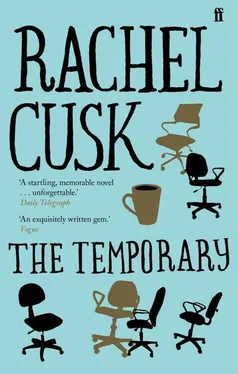Rachel Cusk - The Temporary
Здесь есть возможность читать онлайн «Rachel Cusk - The Temporary» весь текст электронной книги совершенно бесплатно (целиком полную версию без сокращений). В некоторых случаях можно слушать аудио, скачать через торрент в формате fb2 и присутствует краткое содержание. Год выпуска: 2013, Издательство: Faber & Faber, Жанр: Современная проза, на английском языке. Описание произведения, (предисловие) а так же отзывы посетителей доступны на портале библиотеки ЛибКат.
- Название:The Temporary
- Автор:
- Издательство:Faber & Faber
- Жанр:
- Год:2013
- ISBN:нет данных
- Рейтинг книги:5 / 5. Голосов: 1
-
Избранное:Добавить в избранное
- Отзывы:
-
Ваша оценка:
- 100
- 1
- 2
- 3
- 4
- 5
The Temporary: краткое содержание, описание и аннотация
Предлагаем к чтению аннотацию, описание, краткое содержание или предисловие (зависит от того, что написал сам автор книги «The Temporary»). Если вы не нашли необходимую информацию о книге — напишите в комментариях, мы постараемся отыскать её.
The Temporary — читать онлайн бесплатно полную книгу (весь текст) целиком
Ниже представлен текст книги, разбитый по страницам. Система сохранения места последней прочитанной страницы, позволяет с удобством читать онлайн бесплатно книгу «The Temporary», без необходимости каждый раз заново искать на чём Вы остановились. Поставьте закладку, и сможете в любой момент перейти на страницу, на которой закончили чтение.
Интервал:
Закладка:
‘Good girl,’ he said, smiling brilliantly.
Four
Ralph unlocked the door to his flat and as he entered the dark, motionless hall experienced that momentary qualm of ownership which, even after three years of it, still lightly besieged him sometimes when he returned alone at the end of the day. When he had first bought the flat, he used to come home in an eager, questioning mood — often as early as he could — as if it were a lover or a new child, wondering what it had been doing during the hours he had been away. In those days it had represented a form of welcome to him, a region in which his focus was undisputed and reliable. He supposed that he should have worried about intruders or burst drains in that moment of reunion, and prepared himself for the sight of the spilled guts of drawers, the sounds of dripping and desecration to greet him with their anarchic protest at his absence; but his flat had always been as good as gold, sitting waiting for him with an expression either of independence or of neglect, depending on whether he’d left it tidy or not, and in the end he had begun to regard it merely as another cloistered annexe of himself, a space into which the stuffy chambers of his heart and head had gradually overspilled their contents and rendered indistinguishable. He had grown impatient with its inability to be transformed, beyond the small, angular puddle of letters which sometimes gathered by the door and the staring red eye of the answering machine which could occasionally be found resuscitated and blinking with life when he returned, and although of course he was grateful that the glassy eyes of its windows hadn’t been smashed nor its contents ravished with violence, still, he wondered what it would look like afterwards.
Two calling-cards from taxi companies lay on the hall carpet at his feet and he stepped over them as if demonstrating his indifference before an invisible audience. Halfway down the hall he turned back and went to pick them up, deciding instead to find them useful and perhaps pin them on the kitchen noticeboard. With this in mind he continued back down the hall, bypassing the sitting-room where the tawdry drama of the answering machine might or might not have been playing.
The kitchen made a spectral tableau in the falling gloom of early evening, the rigid great-aunts of the chairs around the table, the fridge a tall, stern butler hovering in a corner, the face of the clock obscured to a halt by shadows. He switched on the light and felt immediately comforted by its generic familiarity, its resemblance to other kitchens he had seen. Putting the cards on the table, he opened the fridge and was rather pleased to see a bottle of beer in it, for a moment having no memory of actually buying one. Its further contents — margarine, milk, a yellow square of cheese sealed in plastic, something leafy on one of the lower shelves — reminded him of his trip late the night before to a mini-market two streets away, a dingy place in whose overcrowded aisles nothing ever seemed real or distinct enough to purchase, but where nevertheless he had gone in a sudden burst of life and bought the beer with the intention of its meeting him the next evening in precisely the manner it was now doing. The bottle had been lukewarm and dusty when he took it from the market shelf, but in the cold sunlight of the fridge had been transformed into a green and frosted icon, which in turn elevated the items around it to a more appealing plane. He took the beer and, seeing the cards still lying on the table, picked them up and threw them into the bin.
From the dreary distance of his shabby third-floor office on the Holloway Road, Ralph often looked forward to his three or four solitary evenings at home each week. The fact that, once he had fled the fabricated world of the office and felt the memory of himself begin patchily to return on his bus journey home, he no longer needed to be on his own, seemed continually to elude him in his social calculations. Sitting exposed at his desk he would crave isolation, unlimited draughts of time alone amongst his possessions, but the relief of escape drained him and he would vainly wait for the spring of selfhood which the rock of his daily round had seemed all day to be blocking to begin to flow. Instead, there was merely a resounding emptiness, which made him suspect during his long hours of loneliness that the alien exercise of doing work which did not suit him had forced him to change, moving him further and further from the mouth of his resources until he had become stranded and unable to find his way back. He would often read or listen to music as the night deepened outside, familiar habits which now, however, he would find himself asking for whom or what he did them. His points of reference had grown dim, his signposts muddied: sensations and ideas would arrive and then get lost, circulating around the junctions of his mind, unable to find a connection.
There had been a time, he supposed, when he had not felt this powerlessness, when, had he but perceived his own fluidity, he might have escaped the machinery which was now making him; but he had been so eager to fix himself that all the more discreet aspects of his volition had been swept along by this one great desire for something , and he had followed the first course which presented itself as if it had been ordained that he should do so. He had tried, of course, after he left university, to formulate some plan for his own betterment, but it hadn’t really surprised him to find, when he searched himself for ambition, merely the desire unobtrusively to survive. He had applied for the types of jobs which had become familiar to him through the talk of his peers, had latched himself wearily on to their futures and jogged behind as they rushed towards them, but his inability to imagine that he might be put to some use which would manufacture as its by-product his own happiness meant that the waves of rejection which his activity generated had washed back over him warm with his acceptance of them. He had attended his only interview gratefully, and in the fever of examination did not think to test the position — an inexplicit editorial role on a free local newspaper — for its own merits. Relieved at having pulled off twenty minutes of pleasant conversation with Neil, his boss, he had not considered the future of lengthy encounters by which he was now daily assaulted. Neil had offered him the job there and then, telling him he was the only graduate who had applied; a revelation which at the time Ralph had obscurely taken as a compliment.
‘I’m something of an intellectual myself,’ Neil had said, straightening a tie across which autonomous golf clubs roamed.
The paper was a dreadful thing. Neil wrote most of it, copying stories assiduously from a heap of other newspapers on his desk while Ralph transcribed television listings and local events. Roz, the secretary, typed them up uncertainly. The majority of its flimsy pages were occupied by local advertisers and a long classified section, with which Ralph had at first been fascinated — the things people tried to sell! On his first day he had found one which read ‘Pair of brown men’s shoes, one missing, £5’, and had made his friends laugh telling them about it — but at which now he could scarcely bear to look. The office was terribly cramped, although Neil told him that once the paper had occupied the entire third floor of the building. Since then it had been shouldered into its small corner by a more successful copywriting firm, whose suite of rooms encased behind giant plate-glass windows displayed immaculate grey prairies of executive carpet and desktop. The Holloway Journal emerged weekly from the compressed adjacent clutter, and seeing as it had little organized means of distribution — Neil had tried hiring door-to-door delivery boys, but found out that they were just dumping their consignments in the nearest bin — it was mostly touted on the pavements outside the building where Neil could keep an eye on things. Much as Ralph tried to avert his gaze from the paper during the week, he could not avoid witnessing its fortunes when he left the office on Friday evening. It pained him to see the feeble trajectory of his labours, and the fact that the scrawny boy buckling beneath the weight of his bag couldn’t even manage to give the things away — Ralph watched passersby shy from his thrusting arm, digging their hands in their pockets as he approached them — meant that he usually felt compelled to accept a copy himself and display it as proudly as he was able until he found somewhere to throw it away unseen.
Читать дальшеИнтервал:
Закладка:
Похожие книги на «The Temporary»
Представляем Вашему вниманию похожие книги на «The Temporary» списком для выбора. Мы отобрали схожую по названию и смыслу литературу в надежде предоставить читателям больше вариантов отыскать новые, интересные, ещё непрочитанные произведения.
Обсуждение, отзывы о книге «The Temporary» и просто собственные мнения читателей. Оставьте ваши комментарии, напишите, что Вы думаете о произведении, его смысле или главных героях. Укажите что конкретно понравилось, а что нет, и почему Вы так считаете.












